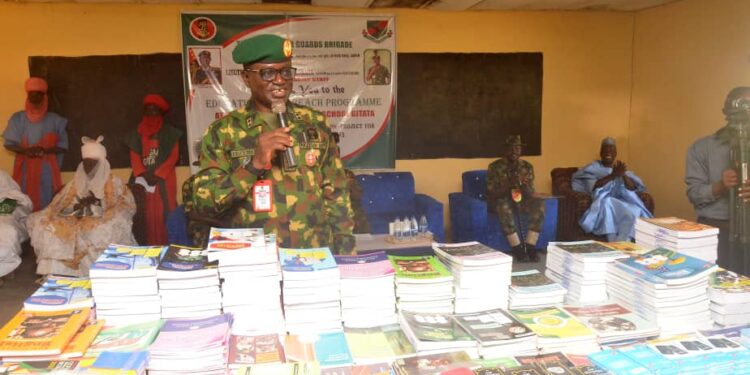The 177 Guards Battalion of the Nigerian Army in Keffi, headquarters of Keffi Local Government, Nasarawa State, has trained and empowered 77 youths on five different skills to making them self reliant.
Emmanuel Ejim-Emekah, Director of Operations in the Nigerian Army Headquarters, confirmed the development at the graduation ceremony of trainees at the Shitu Alao Barracks in Keffi.
Ejim-Emekah lauded the Commanding Officer of the 177 Guards Battalion and initiator of the empowerment programme for his foresight and determination to engage idle youths with skills that will make them independent and improve their living conditions.
“I am quite impressed and happy with the Commanding Officer, 177 Guards Battalion today for this initiative, which is in line with the key philosophy of the Chief of Army, and that is welfare of troops and their families is the key pillar.
“I commend you for this laudable initiative and urge you to sustain it,” he said.
He then urged the youths to maximally utilize the skills acquired during the training period to be gainfully engaged, so as to sustain and support themselves and their families.
“They say the idle man is the devil’s workshop. With this empowerment, you are no longer idle. So we expect a good turnout in the barracks and it’s environs.
He also warned them not rely solely on formal education and neglect the skills they have acquired, as there are no guarantees of government jobs hence the call to the youths to prioritize the skills gotten while also acquiring formal education.
“In the age that we are in and if you go outside this country to developed countries, it is people with skills that are making the most money, because of the skills they have. So the best firm of welfare they have giving you is to teach you a skill. It doesn’t stop you from going to school,” he said.
Adebisi Onasanya, Nigeria’s Army Commander, Guards Brigade also expressed delight with the empowerment programme and thanked the Commanding Officer, 177 Guards Battalion, Keffi for coming up with the initiative and seeing it to fruition.
“It is very important to ensure that youths of this age and time are well engaged. The Commanding Officer deemed it fit to train the youths of this community not in one, not in two but in five different skill sets.
“I can imagine the ripple effects of this effort on the community at large. So I thank the Commanding Officer for the initiative,” he said.
Onasanya then urged the trained youths to reciprocate the gesture of the 177 Guards Battalion Commanding Officer and by large the Nigerian Army by keep improving on the skills learnt and utilizing the skills to be fully engaged and self reliant.
Inuwa, in an address who explained what motivated the initiative was the reports of thefts in the barrack added that despite the ejection of those caught, he decided to put in place an empowerment programme for the youths so they can be gainfully engaged instead of engaging in thievery.
“We still felt an effort should be put in place to engage the youths in the barrack community which led to the introduction of five skills acquisition programmes which are catering, barbing, hairstyling, computer training and cosmetology,” he said.
He assured that, all those that benefitted from the empowerment programme will be given certificates and supported with start up kits so they can begin to put into use the skills they acquired.
Giving a breakdown of the empowerment programme, Mariam Azeez, Supervisor of the programme said the empowerment programme commenced on October 5, 2023 with classes conducted three days a week at the Youth Empowerment Centre in Shitu Alao Barracks.
“We had 22 students in the ICT department, 19 students in the catering department, 15 students in the cosmetology department, 13 students in the hairstyling department and 8 students at the Barbing department with a total 77 beneficiaries,” she said











